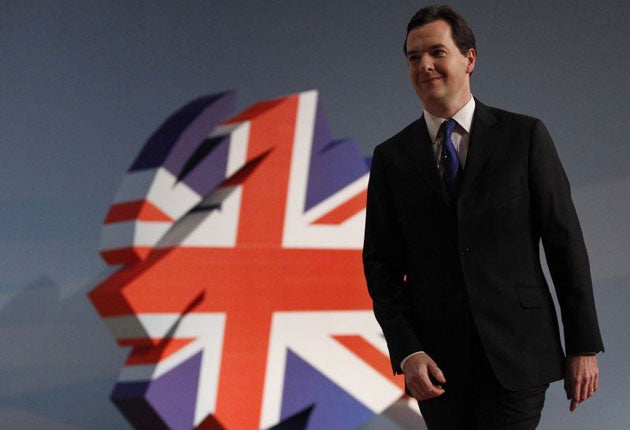Benefits feel the squeeze – but the City doesn't

George Osborne imposed the pain of his spending cuts on the Conservative Party's natural supporters yesterday by announcing that child benefit will be axed for families where one parent pays the 40 per cent tax rate.
In an attempt to reassure the middle classes, the Chancellor's high stakes gamble was coupled with a crackdown on workless families accused of milking the benefit system. Claimants will no longer be able to claim more than £500 a week in benefits – the median income for working families after tax.
In his speech to the Tory party conference in Birmingham, Mr Osborne said his "tough but fair" mantra would also apply to the banks. He warned: "We will not allow money to flow unimpeded out of those banks into huge bonuses, if that means money is not flowing out in credit to the small businesses who did nothing to cause this crash and suffered most in it."
Anger over the banks will be fuelled by a report today by the Centre for Economics and Business Research showing that cash bonuses are to hit £7bn this year.
But the Chancellor's threat may prove an empty one. He has already imposed a tax on banks' balance sheets and is unlikely to go further unless there is international agreement on a financial activities tax.
The child benefit changes and £26,000-a-year cap on benefits will apply from 2013. Some 1.2 million households will lose child benefit, saving the Treasury £1bn of the £12bn bill. The 40 per cent tax threshold starts at £43,875 but the Treasury estimates the median income of the losing households at about £75,000.
It admits the shake-up will create anomalies: a two-earner couple both on £40,000 a year will keep their child benefit, while a family with a single earner on £45,000 will lose theirs. The benefit is worth £20.30 a week for the first child and £13.40 for each subsequent child. So one-child families who lose out will be £1,055 a year worse off and those with three children £2,500 worse off.
The move is highly controversial. Critics said it undermines the principle of universal benefits locking the middle classes into the welfare state. It also contradicts pledges made by David Cameron, Mr Osborne, Nick Clegg and Vince Cable in the run-up to the May election.
Mr Clegg endorsed yesterday's change but there are signs of a backlash from the Liberal Democrats, whose conference two weeks ago voted to retain child benefit as a universal payment. Bob Russell, MP for Colchester, told The Independent: "If I have an opportunity to vote against it, I will. I support universal child benefit. It is a guarantee for the child because it is paid to the mother."
The new annual cap on benefit claims will save an estimated £250m a year and will affect tens of thousands of workless families. It will apply to combined income from jobseeker's allowance, income support, incapacity benefit, council tax benefit, housing benefit, child benefit, child tax credit, carer's allowance and industrial disablement benefit. However, free school meals, disability living allowance and war widows benefit will be excluded.
In practice, money will be deducted from housing benefit, forcing families to move to cheaper accommodation – especially in central London.
This will be done by local authorities until the introduction of a new universal credit for working age benefits, which Mr Osborne has agreed with Iain Duncan Smith, the Work and Pensions Secretary.
Mr Osborne told the conference that the reforms were part of "a new welfare state where it always pays to work – tough but fair, because we are all in this together." He said he understood that most higher rate taxpayers were not the "super-rich" but added that "a system that taxes working people at high rates only to give it back in child benefit is very difficult to justify at a time like this."
The Chancellor added: "Unless they have disabilities to cope with, no family should get more from living on benefits than the average family gets from going out to work. No more open-ended chequebook."
He argued that his benefits cap would increase the incentive to work. But the Institute for Fiscal Studies warned that the child benefit change could seriously distort incentives for families. Those just below the £43,875 threshold could "find themselves considerably worse off from a small rise in income" because they would lose all their child benefit as soon as their income crossed the threshold, it said.
Join our commenting forum
Join thought-provoking conversations, follow other Independent readers and see their replies
Comments